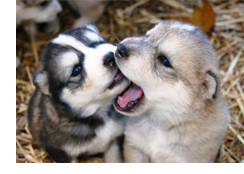
With our latest session of puppy school classes coming to a close and our next one starting this week what better time to go over the vital importance of socialising your dog!
WHY SOCIALISING YOUR DOG IS SO IMPORTANT
Puppy School classes in every Vet who holds them will always start socialising your dog from a very early age. This is because research has proven that puppies with poor socialisation skills from a young age will end up with serious, long lasting behavioral issues later down the track. And anyone who has put up with an unruly pup can tell you that it can be miserable, not only for pet parents but also for the pooch themselves.
Like humans, dogs are social creatures. They love to communicate and are receptive to all different things during those early weeks of their lives, so missing out on vital parts of life during their first 3 months leads to phobias, fears and anxieties later on. Once this important time is over there is no compensating for it, and sadly many dogs are displaced because of social and behavioural problems due to poor socialisation.
THE BEST AGE FOR SOCIALISING YOUR DOG
Critically, the ideal age for socialisation starts at just 3 weeks and ends around 12 weeks, meaning that when people buy their new puppy they usually have less than a month to introduce their fur friend to a variety of people, places, noises, situations and objects.
PUPPY SCHOOL
Puppy school classes like those held at Pet Doctors are a safe learning environment for puppies to meet other puppies their age for some supervised play. They run for 4 lessons and give a great basis for which you can start socialising your new fur friend while out and about. Pet parents will also receive plenty of information on pet care and health as well as a lesson with a reputable professional trainer in the 3rd week of the Pet Doctors course.
WHAT TO INTRODUCE YOUR PUPPY TO
You want to find a variety of things, including:
- Different sizes and shapes of dogs
- Children (with supervision)
- People of different ages, genders, ethnicities
- People with facial hair, hats, deep voices
- Loud noises and environments (factor in alarms, storms and fireworks)
- Traffic, bikes, skateboards, motorbicycles etc
- House noises like the fire alarm, vacuum and doorbell
- Objects like umbrellas, balloons, briefcases
- Also get your dog used to being handled by gently touching his ears, looking in his mouth, holding his paws and touching his nails and practice putting his collar/harness on.
Make sure exposure to these things is gentle and supervised. If you notice your puppy becoming afraid or anxious tone back their exposure or remove them completely. Remember to keep praising and rewarding your dog for good behaviour and ignore any bad behaviour.
KEEPING YOUR PUPPY SAFE
Critical socialisation needs to be done before your puppy’s first vaccination so a few precautions will need to be made before taking them out.
- Avoid dog parks, dog beaches and places frequented by other dogs with unknown vaccination status.
- Avoid places where an un-vaccinated dog may have been up to 2 years prior.
- Ask a friend with a vaccinated dog to set up a play date.
- Stick to concrete paths as parvovirus doesn’t survive well on concrete in direct sunlight as opposed to a park with grass and shade.
- Attend puppy school class after the first vaccination.
Utilising this small window in a dog’s life to the best of your ability will decrease the chances of your fur friend developing a problem later in life. It will also strengthen the bond between you both for a lifelong friendship.

